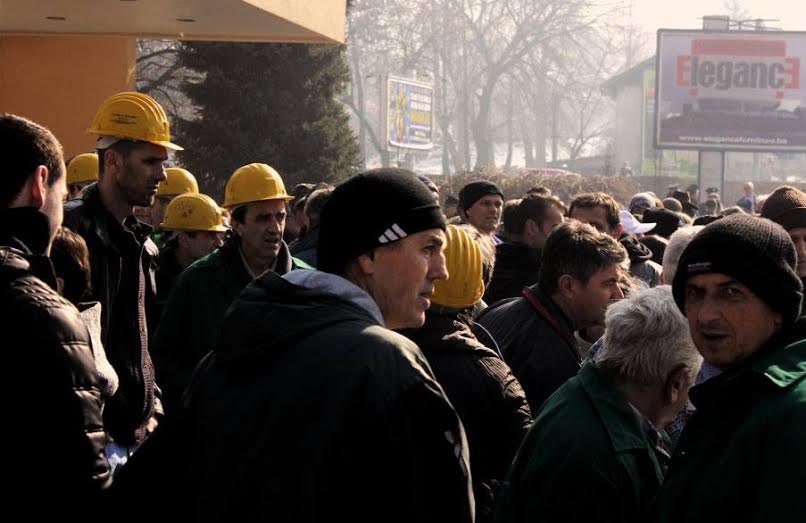Interviewed by Philippe Alcoy
This reflexion can help us understand the current situation of the working class in these countries. It can also provide lessons for western countries about unionist actions in moments when the employers and the governments are on the offensive against the hard earned rights of the working class.
Left Voice: During the period known as “transition” the workers and masses in former “socialist” countries of Central and Eastern Europe (CEE) experienced a deep decline in living standards, an explosion of unemployment, privatizations and factory closures. In this context, unions ability and/or willingness to resist, organize protest, strikes and worker’s struggles seemed very low. How can you explain this? What was the government and the bosses’ attitude towards the labor movement, which avoided workers resistance and mass protests?
Mihai Varga: The changes of the 1990s were so dramatic that people had little time to think about protests. Most simply cared about survival. In many countries, governments did a lot to make sure that the implosion of GDP did not lead to unemployment (Russia and Ukraine), and if it did , then they made sure that unemployment did not lead to mass protests (Poland, Hungary). States actively intervened in the economy so that unemployment and impoverishment did not become political issues.
Unions played a large part in this. In Hungary and Poland, they endorsed government policy, most likely for ideological reasons. In Russia and Ukraine, unions threatened to become involved in organizing discontent and representing protesting workers around 1993. However, this did not happen, as states financially and juridically allowed unions to carry out the same tasks as they did under Communism.
In other countries, governments were ready to negotiate with unions over reforms and even accepted some demands, such as limiting the spread of fixed contracts and of mass redundancies (the Czech Republic). Others saw extreme conflicts between unions and workers on one hand and government on the other (Romania, Bulgaria, Croatia). Finally, the Baltic State governments depicted the unions and workers questioning the direction of reforms as tools of Soviet (and later Russian) dominance.
LV: There is a paradox in many CEE countries: the average level of unionization, is often very high compared to western countries, but that doesn’t mean that unions are strong or that they have a big influence in political or social life. At the same time, many workers are unionized but they don’t even know who the union delegates are, even at the plant level. It seems that there is a gap between union membership and union activism. What are the reasons for this characteristic of union movement in many CEE countries?
M.V.: Many unions were set up during communism and barely or never underwent reforms in order to get closer to workers and their interests. This applies most to unions in post-Soviet countries, and least to unions in the Czech Republic and Slovenia. Some unions however (the two largest Polish unions, for instance) recently underwent reforms and learned that a members who can be mobilized to protest are the best guarantee that governments will take them seriously.
LV: In your book “Worker Protests in post-communist Romania and Ukraine”, where you analyze many workers struggles in those countries, you develop the concept of “workers interest representation” to analyze unions. Can you explain this concept and how it can help us understand union movement?
M.V.: It is actually a concept that I borrowed from Richard Hyman (author of a Marxist Introduction to Industrial Relations). It makes us pay attention to issues of organizational autonomy (How were unions established? Through worker initiatives or directives from above? And who sets their goals nowadays?); legitimacy (gains that are relevant to what workers want); and effectiveness (How many of their goals do unions actually reach? What do they give up in order to reach their goals?).
Previously we mostly looked at what unions gained, without questioning whether whatever they got was relevant to workers, or questioning problematic compromises that workers did not approve of in order to reach these “gains”.
LV: Since the beginning of the global economical crisis we saw some strikes at the plant level, general strikes, mass mobilizations, and some governments even fell (Slovenia, Bulgaria, Ukraine, Moldavia, etc.). Did unions play a role in this shift? What was their attitude toward austerity measures adopted by different governments?
M.V.: The biggest surprise was the development in Poland. In response to austerity, the two unions there worked (and went on strike ) together for the first time, against the PO government. It will be interesting to observe what approach they will take in relation to the Law and Justice Party (Prawo i Sprawiedliwosc –PiS).
Although I did not look into some of the countries you mention (Slovenia; Bulgaria; Moldavia) in the context of the crisis, I do follow events in Hungary, Romania, and Ukraine. In Hungary and Romania governments went very far in containing unions through an all-out attack on their rights, and their leaders (see my and Annette Freyberg-Inan’s work on Romania). In Ukraine, trade unions stayed remarkably silent. In response, the far-right is attempting to set up its own trade unions and gather support among workers.
LV: In these mobilizations against governments, corruption and austerity, people developed some new forms of protest like occupation of squares in Ukraine and in other countries like Romania, Bulgaria, etc. Do unions participate in those movements?
M.V.: Unions in Romania and Bulgaria endorsed such actions. In Ukraine, because of the divisive nature of Maidan with respect to the country’s East-West issue, it is understandable that unions stay out of conflicts.
LV: Do you think that studying and understanding union movement in CEE countries is useful for understanding union’s tactics and strategies in the West?
M.V.: Very much so. We have two extremes in post-communist Europe: the Baltic States with their offensive to cut wages and please the European Commission and Hungary with its workfare-approach, making welfare and social protection conditional upon work (and that work is payed at 70% of the minimum wage). How did we end up here? The ways in which states dealt with unions throughout the last 25 years can explain a lot. For Western unions it should be a warning about what happens if unions loose the strike threat.
Our first printed issue A New Generation Rises Up is out. Get it at your nearest radical bookstore or order online . For shipping outside the US please contact us.











